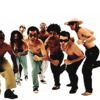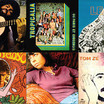Ilumencarnados seres
josé celso martinez corrêa
Testimonials
When I first heard the songs “Alegria, alegria” (in English: Happiness, happiness) by Caetano Veloso and “Domingo no Parque” (in English: Sunday in the park) by Gilberto Gil, I felt the consecration of the most fundamental word in my life: “happiness.” I felt in these songs the joy of being in the park, in the streets, in the agora, in the public square. I felt that “happiness is the proof of the pudding” (“a alegria é a prova dos nove”) from Oswald de Andrade’s Manifesto.
We staged “O Rei da Vela” at Teatro Oficina. The country’s theatrical environment up to 1967 was similar to a closed shoe box. But Oswald de Andrade’s play asked us to have some light come into the theatre. So, we transformed Oficina into a “Sunday-in-the-park” environment, sunny, a place of happiness. Today, this space is Modernism’s and Tropicalism’s backyard. Teatro Oficina is a barbarian and technical space: it is Tropicalista.
I dedicated the staging of “O Rei da Vela” to Glauber Rocha’s film “Terra em Transe” (“Earth Entranced”) because at that time the country, as the whole world, was in a trance, close to a cultural and social revolution. The film came up at that moment with a great seismic revelation of this earthquake which would later be totally repressed by a counter-revolution, by a military coup, and afterwards by the establishment of a neocolonial globalizing model.
Tropicalismo was interconnected to the earth entranced movement, to the earth fated to accomplish a social revolution, a revolution that would bring equality – which is Brazil’s fate by rights – and cultural sovereignty.
It is a movement to be completed. I do not know if it will still be called Tropicalismo or Tropicália, because it is the same movement that in determined moments in History gains a visibly configured brightness – an epiphany. It is the same dream of Sérgio Buarque de Holanda, Euclides da Cunha, Darcy Ribeiro. We saw it in Modernism, especially in the Cannibalist Manifestos, as we can see it nowadays in the ideas of people like Gilberto Vasconcelos, Bautista Vidal, Mangabeira Unguer, philosophers who think about the tropics and who have an original political view of Brazil. A Brazil to be completed, which has the lively life of those located where it is, in the tropics, connected to other countries in a similar situation, other sunny countries of the world.
Tropicalismo is the decolonization culture, it is the culture that releases the vital strength of the sunny countries, colonized in the last century and now being recognized by the hegemonic American culture. Precisely now we find ourselves in a crucial moment because Brazil’s dispute with the “colonizing culture” is even more unequal now than during the dictatorship. During the dictatorship, we still had the public notion of culture, the notion of the State’s constitutional public duty to invest in culture. We were aware that the public needs should not be faced in an immediate basis.
But capitalism tends to see everything exclusively as a commodity. So, how do we read Tropicalismo today? Tropicalismo is banana, a few coconut trees, a mixture. It has become a cliche, that is, a Tropicapitalism. The movement was exploited but it is much more comprehensive than a simple mark or something that happened.
Tropicalismo’s fundament is cannibalism and only cannibalism can unite us. In this sense, it is also like Marxism: you can only understand Marxism when you are in movement, fighting. If you’re not into a process of cultural devouring, cultural creation, you cannot realize the Tropicalismo. It is no use studying it as if it were something dead. You must be able to think about the entranced earth, plug your thoughts. Your electric body has to be plugged into the electric body of that which is called the “third world” – not the civilizing, but the barbarian universe that brings another civilization – you have to be able to think about the moving forces, to think that there is the Sem-Terra (Landless) movement, that there is banditry and that behind banditry there is the Rap as a possibility for a cultural revolution, for the progression of the cultural revolution. Tropicalismo must be tasted for its eternal, almost universal, Nietzchean, vital aspects.
It is alive today and it is dangerous. “Living is dangerous,” says Guimarães Rosa. So, if we are to understand and recreate Tropicalismo, escaping from Tropicapitalism, we need to be in danger, as the backland bandit.





















